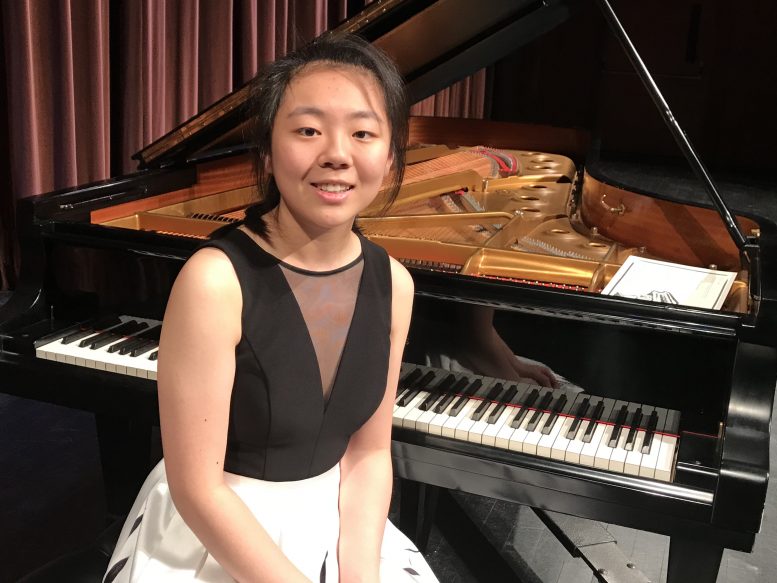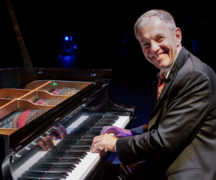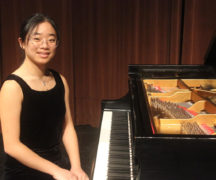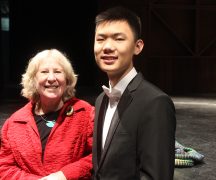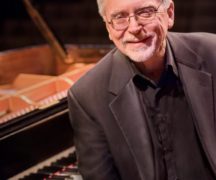By DAVID DUPONT
BG Independent News
Beethoven’s “Waldstein” sonata could very well serve as the theme song for the David D. Dubois Piano Competition and Festival at Bowling Green State University
The sonata opens with an insistent series of repeated chords broken up with a flourish of notes higher on the keyboard before a sudden rush of notes.
In that opening passage, the listener can hear the technique and emotion that makes it such a popular piece at the Dubois and other competitions.
On Sunday morning, two of the seven finalists included the “Waldstein” in their programs. For those who attend the event, now in its 10th year, that’s just one of the familiar aspects along with the ghostly dim-light in Kobacker Hall, the listeners who seem to make up for their scarcity with their intensity, and the brilliance of the playing by some of the top teenaged pianists from around the country and elsewhere.
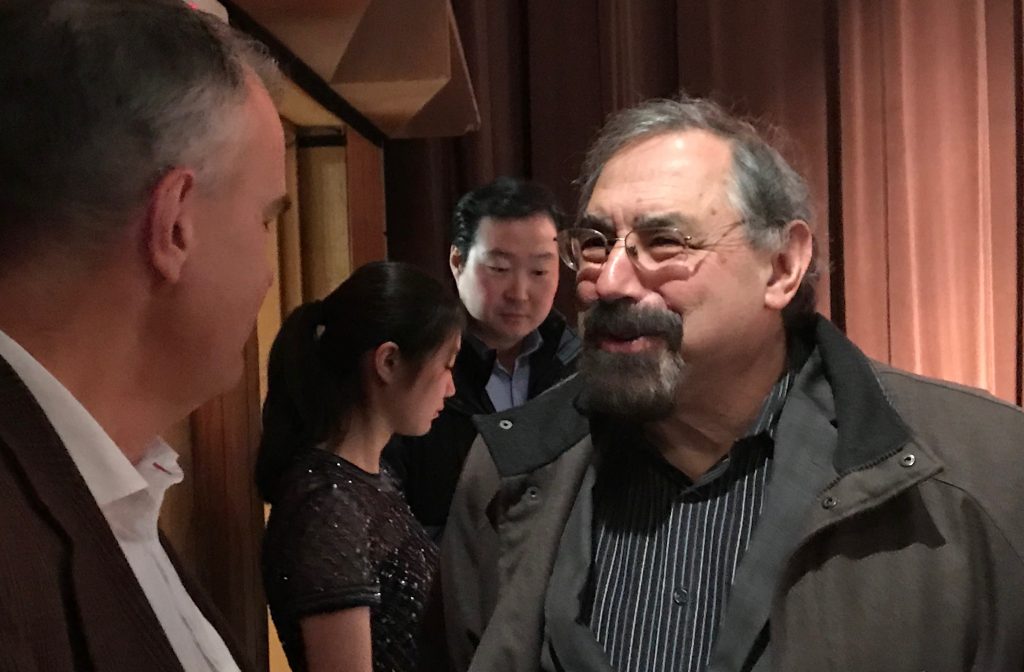
“I must say I was tremendously impressed with the very high level of performance,” said Boris Berman, a concert pianist on the Yale faculty who served as guest artist and one of the three judges for the finals. “It seems like there was such a naturalness in playing of the finalists and good taste, impeccable technique, and really sensitive musicianship. It was not easy to reach the decision. … There was a lot of merit in each of the contestants.”
Also judging the finals were Virginia Marks, retired from the BGSU piano faculty, and Steven Michael Glaser, from Ohio State. The semifinals on Saturday were judged by Christopher Harding, of University of Michigan, Jackson Leung, of Wright State, and Tianshu Wang, of Capital University.
As it turned out, the winner was a familiar face. Kasey Shao, 16, of Cincinnati, also performed in 2018 when she was a finalist and 2019 when she placed third.
She has returned she said because “this competition is so organized and so inviting, and they have such great guest artists.”
Berman, she said, is one of her “idols,” and she plans to apply to Yale.
So she wanted to come to hear him play — he performed a recital of Schubert and Chopin Saturday night that had people buzzing the next morning — and get his response to her playing.
Asked what made Shao stand out, Berman said: “For me she was the most compelling. She made me listen more than anybody else in the sense that she had her vision, and it was apparent and that was most important.”
Shao won the $3,000 first prize.
Other prize winners were: Alena Lu, 16, Potomac, Maryland, second place, $2,000; and a tie for the $1,000 third prize between Tan Nguyen, 15, Leesburg, Virginia, and Abhijit Devalapura, 17, Columbus.
Maxine Park, 15, from Hanover, New Hampshire, received an honorable mention. Other finalists were Natalie Zhang, 15, Weston, Massachusetts, and Arun Kamath, Cincinnati. Twenty-three semifinalists came to BGSU to compete.
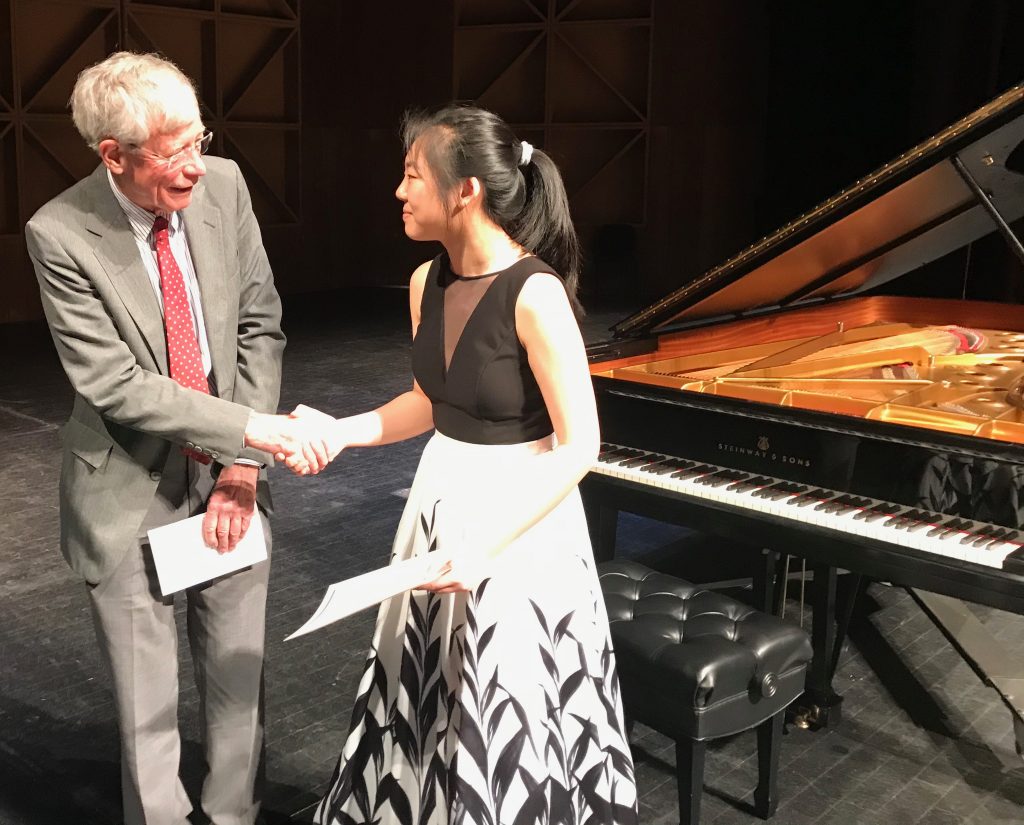
Shao started playing at 6. “I was very active kid who liked to jump around and all that,” she said. “My mom asked her friend how she could get me to sit down and be still and concentrate on something.” The friend suggested the family buy a piano.
That’s how Shao began what she called a long journey that has given her great joy.
At first, she said, the piano was just “one of the big toys I had in the house.”
But as she took lessons and learned more, Shao said, “I really fell in love with the music and the instrument.”
A teacher introduced her to the work of J.S. Bach. His music is at once simple and complex, the teen pianist said, just like the piano itself.
In the finals she performed Bach’s French Suite No. 6.
Sh also performed a Beethoven sonata — in D Major from Opus 10, not the “Waldstein.” This sonata is also, she said, very often performed, even overplayed, at competitions.
“So one of the important things, also a really fun things for me, is to break the piece apart and approach it like I’ve never seen it before. You start seeing these new things, these little colors and nuances you can bring in to make this piece feel fresh.”
In performing the sonata it’s important “to stay true to the score and stay true to what Beethoven wanted, going back to the score, restudying it and conveying him through the piece and not me.”
She’s also interested in art and science. Her mother is an artist so “art has been part of my life since the very beginning.” Her father is an immunologist, so science has played a large role in her life as well.
Shao plans to major in piano performance in college, and beyond that hopes to pursue a career as a performer.
Robert Swinehart, the executor of the Dubois estate, was on hand as he always is.
He’s struck by how “the talent of the youngsters has improved immensely. I’m so impressed with their abilities.”
More than a decade ago, the Dubois Foundation put out a call for proposals programs to support young musicians.
Swinehart said the foundation received 17 applications, and the one from BGSU written by Laura Melton, of the piano faculty and now chair of Music Performance, rose to the top. There was not much question that the endowment would go to BGSU.
Everyone involved, he said, is impressed with the plan and how it is carried out. “I believe it has met all Dr. Melton’s expectations and more.”
That includes bringing in the guest artist who in addition to judging the finals and performing a recital, also presents a master class for BGSU undergraduate pianists.
Swinehart noted the patience and generosity with which Berman worked with students during the class on Friday afternoon.
On Saturday night when Berman performed, those students were on hand to hear him, and afterward lined up to greet him and thank him for his guidance the previous day,
“I just have to congratulate the staff for this wonderful experience,” Swinehart said. “I’m sure if Dave Dubois were here today he would be very pleased with the progress the endowment has made.”

